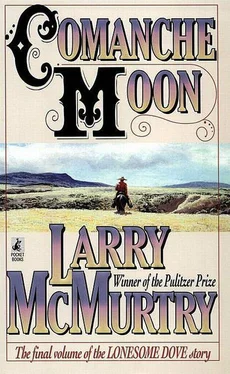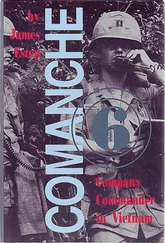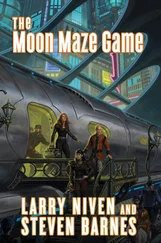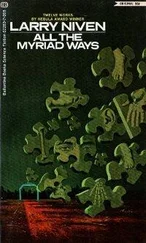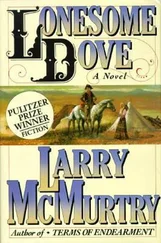Neely Dickens, besides being quick to flare up, was also prone to attacks of severe pessimism if an undertaking of a dangerous nature was anticipated. When it became clear that they would all be required to go in pursuit of the raiding party, Neely immediately fell prey to dark forebodings.
"North--I thought we was through going north," he said. "I despise having to travel back toward the dern north, where it's so windy." "Then why'd you get in the rangers, anyway?" Teddy Beatty asked. "Rangers just go whichever direction they need to. You're in the wrong profession if you're picky about directions." "Couldn't get no other job," Neely admitted. "If I'd known I was going to have to go north I'd have tried to make it to Galveston instead." Augustus found the remark puzzling. Why would a fear of the north convince anybody that they ought to go to Galveston?
"Why Galveston, then, Neely?" he asked. The boy's grave had been hastily covered and the troop was ready to move in the direction Neely despised.
"Ships," Neely said. "If I was in Galveston I might could hide in a ship." "That don't make no sense," Long Bill observed. "Ships go north too." Neely Dickens was sorry he had ever brought the matter up. All the rangers were looking at him as if he were daft, which he wasn't. All his life he had heard stories about Comanche tortures. Several of the older rangers had described the practices to him. Comanches slit people open and poured hot coals into them while they were still alive.
"I won't have no Comanche cutting a hole in my belly and pouring in hot coals," he said, by way of explanation of his dislike of the northerly direction.
"Shut up that talk--let's go," Call said.
The men had been blue and apprehensive since Captain Scull left anyway--dwelling on the prospect of torture would only make matters worse. He knew from experience that when morale began to slip among a group of tired, ill-fed, nervous men, a whole troop could soon be put at risk, and he didn't intend to let that happen, not on his first try at being a captain.
He turned his horse and stopped the troop for a moment.
"You need to think about your horses first and foremost," he said. "Be sure their feet are sound. A lame horse will get you scalped quicker than anything in this country." "And be sure to sight your rifles every morning, too," Augustus added. "Bouncing around all day in a saddle scabbard can throw a gun off sight.
If a red warrior forty feet away is about to put an arrow in you, you don't want to have to stop and fix your sight." Teddy Beatty resented such instruction, particularly since the two captains were both younger than he was.
"I can't think about horses and guns all the time," he said, in a tone of complaint. "There's too much time for thinking out here on the plains." "Think about whores, then," Augustus said.
"Pretend you won enough money in a card game to buy fifty whores." "Buy fifty whores and do what with them?" Long Bill asked. "That's too many whores to worry with even if I wasn't a married man --and I am a married man." "It's just something to think about that's more cheerful than torture," Augustus explained.
"Survival's more cheerful than torture," Call said. "Watch your weapons and your horses and stay close to the group. That way you won't suffer nothing worse than hearing Gus McCrae talk about whores seven days out of the week." Neely Dickens heard the ^ws, but the ^ws didn't change his opinion. In his view it was hot coals in the belly for sure, if a man lingered too long in the north, in which direction, led by their young captains, they were even then tending.
Neely still thought the best plan would be to make for Galveston and hide out in a ship.
Maudy Clark only wanted to die--die and have no more freezing, no more outrage, no more having to worry about what Tana, the cruelest of her captors, would do to her at night, when they camped. Tana led the horse she was tied to himself; sometimes, even as they rode, he would drop back to pull her hair or beat her with a mesquite switch. Those torments were minor compared to what Tana and the other three Comanches did to her in camp. She had never expected to have to bear such abuse from men, and yet she still had two living children, Bessie and Dan, and could not allow herself to think too much about the luxury of death.
William, her husband, had been away, driving some stock to Victoria, when the four Comanches burst into her cabin and took her. The babe at her breast, little Sal, they had killed immediately by dashing her head against a log. Eddie, her oldest boy, hurt his leg in the first scuffle --the pain was such that he couldn't stop whimpering at night. Maudy would hear him crying even as she endured her torments. On the sixth day the Comanches lost patience with his crying and smashed his head in with a gun butt. Eddie was still breathing when they rode on--Maudy prayed someone would find Eddie and save him, but she knew it was an empty prayer. Eddie's head had been broken; no one could save him even if they found him, and who would find a small dying boy in such emptiness?
But Bessie and Dan, three and five, were still alive. They were hungry and cold, but they had not been hurt, apart from scratches received as the horses crashed through the south Texas brush.
Several times, during periods of outrage, Maudy had thought of grabbing a knife and slashing her own throat, but she could not surrender her life while her children needed her. Bessie and Dan had stopped watching what the men did to their mother. They sat with their eyes down, silent, trying to get a little warmth from the campfire. When the men let her tend them, Maudy fed them a few scraps of the deer meat she was allowed. She meant to keep them alive, if she could, until rescue came.
"Pa will be coming--he'll take us home," she told them, over and over.
Maudy knew that part was a lie. William wouldn't be the one to find them, if they were found and saved. William barely had the competence to raise a small crop and gather a few livestock; he would never be able to follow their trail from the brush country to the empty plains.
Besides, he had left home to be gone two weeks or more; he might not yet even realize that his cabin was burned, his baby dead, his pigs scattered, and his family stolen. Once he did discover it, there would be little he could do.
Yet Maudy held on to hope, for Bessie and Dan if not herself. She didn't know why the young Comanche Tana hated her so, but in his eyes she saw her death. She had seen children brought back from Comanche captivity before, and most recovered.
Bessie and Dan were sturdy children; they would recover too. But for herself she had no hope.
She and William had discussed the prospect of capture many times; everyone who farmed on the frontier knew women who had been taken. In those discussions William had always firmly instructed Maudy to kill herself rather than submit to savage outrage. There was always a loaded pistol in the cabin, just for that purpose.
William hated Indians. His parents and both his brothers had been killed in Indian raids on the Sabine River. More important to William even than the lives of his children was the knowledge that his wife, Maudy, would not be sullied by the embraces of red Comanches.
Maudy knew William was not alone in that feeling. Many men on the frontier made clear to their wives that they would not be accepted back, if they were taken and allowed themselves to survive. Of course, some men wavered and took their wives back anyway; but William Clark had nothing but scorn for such men. A woman who had lain with a Comanche, or any Indian, could not again hope to be a respectable wife.
So Maudy knew she was lost--she had been nursing little Sal when the braves burst in. It was a moment of deep peace, her last. She was caught before she could reach the pistol. That night, when Tana began his outraging, Maudy knew that her life with William Clark was lost and gone.
Читать дальше
